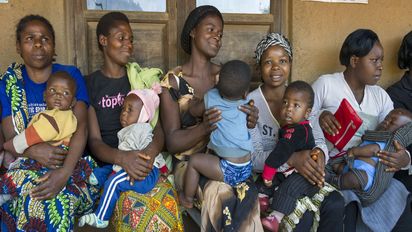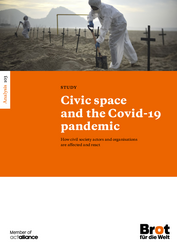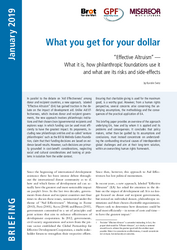
Ensuring the Right to Health
Disease brings a great risk of poverty worldwide, while the poor are at greater risk of disease. There are various ways to break this vicious circle and promote the health of all people.
Preventable Diseases, Preventable Suffering
Every day some 16,000 children under five years of age die, most of whom could survive if they had access to adequate health care. Millions of people suffer from preventable or treatable diseases. Although health is enshrined as a human right, those who live in poverty are often denied this right. They suffer from malnutrition, poor living conditions and dangerous working conditions. All these circumstances make them sick.
The Vicious Circle of Poverty and Disease
The poor are demonstrably more prone to illness, and thus to even deeper poverty. In addition, every year around 100 million people become impoverished as a result of illness: due to high treatment costs, significant loss of income or the inability to work. Social welfare systems are lacking or poorly-developed, around 80 percent of the world's population lives without protection against the basic risks of life such as illness or unemployment. One promising way to break this vicious circle is to introduce universal and therefore affordable health care for all. Furthermore, poverty must be combated to its full extent so that more people can live and remain healthy.
Improving Global Health
The sustainable development goals (SDGs) envisage a rapid escape from the vicious circle of poverty and disease. The United Nations wants, to “ensure a healthy life for all people of all ages and to promote their well-being” by 2030. This is stated in the third of its 17 goals, and almost all of the other goals are directly or indirectly linked to health. Thereby it becomes clear, that health is an important cross-sectoral issue for sustainable development.
According to the motto “leave no one behind” the SDGs apply not only to developing countries, but universally. To achieve the health-related SDGs, the World Health Organisation (WHO) of the United Nations must be strengthened. As a standard-setting and co-ordinating institution, it should be responsible for better interaction between global health policy actors, so that ultimately all people can live healthy lives and receive care in the event of illness.
What Brot für die Welt Does
We work for the health of people in poorer countries through political work and projects. We are active in various national and international networks, for example the VENRO Working Group on Health, the German Platform for Global Health and the World Council of Churches. As part of the Geneva Global Health Hub (G2H2), Brot für die Welt (Bread for the World) is co-coordinating a working group on “WHO and Global Health Governance and Financing”. The G2H2 is an alliance of NGOs and activists from all over the world and it is committed to the democratisation of global health policy.
With our partners, we monitor the actions of governments, international institutions such as the WHO and private companies in the field of global health. Brot für die Welt connects partner organisations with political decision makers as well as with civil society networks. This allows them to bring their positions and concerns into the political discussion. We focus strongly on the role of the World Health Organisation, in whose executive board meetings as well as the annual World Health Assembly Brot für die Welt participates as observer.
Empowering the Communities
The core themes of our policy work are the fight against neglected tropical and poverty related diseases, the implementation of the sustainable development goals for health, the fight against malnutrition and the strengthening of the global health architecture.
With the health projects that we support, we and our partners are committed to discrimination-free access to health services and support in particular community-based health work following the “Primary Health Care” concept. This empowers communities to treat and prevent diseases under their own responsibility and to promote health in general, for example through healthy nutrition. A significant goal of our co-operative work is the sustainable financing of health care, so that nobody is excluded for financial reasons and we can finally break the vicious circle of poverty and disease.
Download




